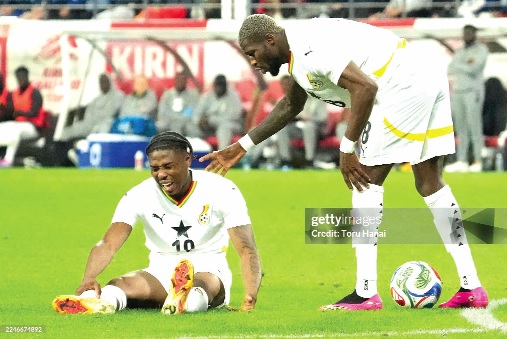The horrific injury suffered by Black Stars midfielder Francis Abu in the Kirin Cup match against Japan last week was a chilling reminder of the brutal risks footballers take each time they wear national colours.
In a split second, a committed block to protect the team left the 23-year-old with a double fracture above his ankle, his foot twisted in the wrong direction, and Ghana collectively holding its breath.
Yet amid the shock and anguish, there is a developing story of resilience, professionalism and hope. That Abu may still return in time for the 2026 FIFA World Cup is nothing short of extraordinary.
But more importantly, his injury presents Ghana with a wider test: whether we are prepared to give our players not just applause when things go right, but the full medical, emotional and institutional support they deserve when things go wrong.
To their credit, both Toulouse FC and the Ghana Football Association (GFA) have taken decisive early steps. Abu’s successful surgery at the Toyota Memorial Hospital in Japan last Saturday was the result of swift coordination between the Black Stars’ medical chief Dr Prince Pambo, Toulouse’s medical staff and Japanese specialists.
This level of collaboration reflects the respect both institutions have for the player’s welfare.
Equally commendable is the GFA’s decision to keep a dedicated physiotherapist with Abu during the acute phase of his rehabilitation, and to assign a senior member of the technical team to accompany him to France after discharge.
These actions go beyond box-ticking; they signal a duty of care that should be the standard, not the exception.
Medical experts estimate a four-to-six-month window for bone recovery if all goes well, followed by intensive physiotherapy and conditioning.
It is a tight race, but the World Cup door is not closed. Ghana must therefore remain fully invested in his return, both for the team’s sake and for the young man’s long-term career.
The memory of Jerry Akaminko, who suffered a similarly devastating injury days before the 2014 World Cup, should linger as a cautionary tale.
Despite support from the GFA—including financial assistance—Akaminko’s brilliant career was never the same. His story underscores the lifelong impact such injuries can have and why the nation’s duty of care cannot end at surgery or initial rehabilitation.
In fact, in the unlikely event that Abu does not recover in time to make the final World Cup squad, the GFA must still ensure he travels with the team.
His presence will aid his emotional healing, reinforce his value to the national project and send a strong message to every player who risks limb for Ghana: your sacrifice will never be forgotten.
Coach Otto Addo now faces additional injury setbacks—Mohammed Salisu and Antoine Semenyo have also been ruled out of tomorrow’s friendly against South Korea—yet these challenges must not overshadow the central duty before us.
Francis Abu needs Ghana. Not merely as fans, but as a system that protects its heroes. If we expect players to give everything for the flag, then the least we can do is stand firmly beside them when the cost of their courage comes due.

